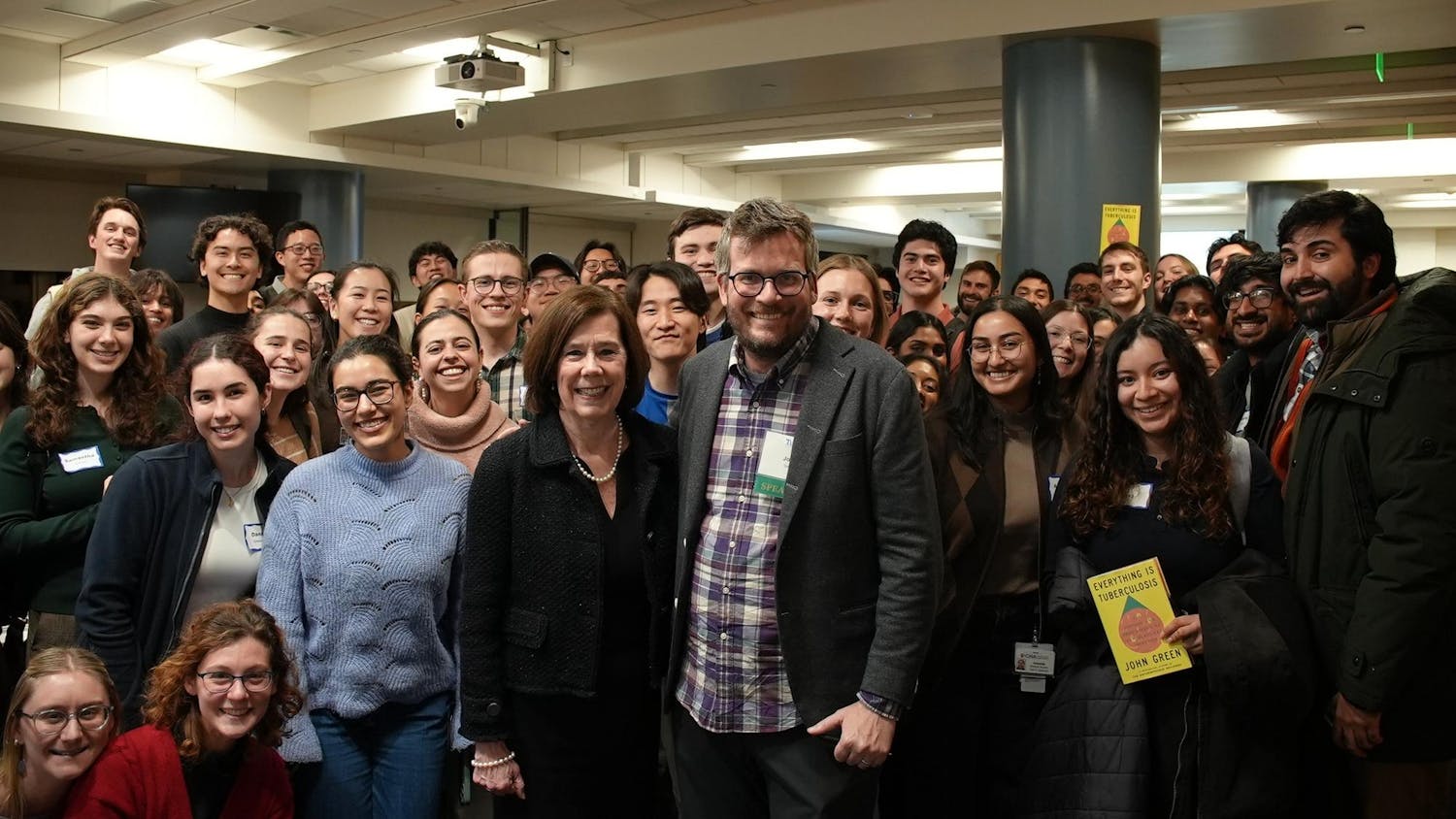Throughout the last year, Tufts Labor Coalition (TLC) has been organizing in support of DTZ custodial employees who work on Tufts’ campuses. Students, faculty, staff and members of the custodians’ union, Service Employees International Union (SEIU) 32BJ, held demonstrations in opposition to a reorganization of the staff, which was originally estimated to result in 35 layoffs and was projected to save the university $900,000 annually. After the restructuring was implemented earlier this year -- ultimately displacing 18 custodians, seven of whom are no longer working with DTZ -- efforts have turned to fundraising in support of those workers who were affected.
In the second installment of this four-part series, the Daily charts the two-decade history of similar clashes between students and custodial workers and the Tufts administration.
1994: Outsourced
In early 1994, Tufts custodians were employees of the university who received health care packages, tuition remission for themselves and their children and pension plans.
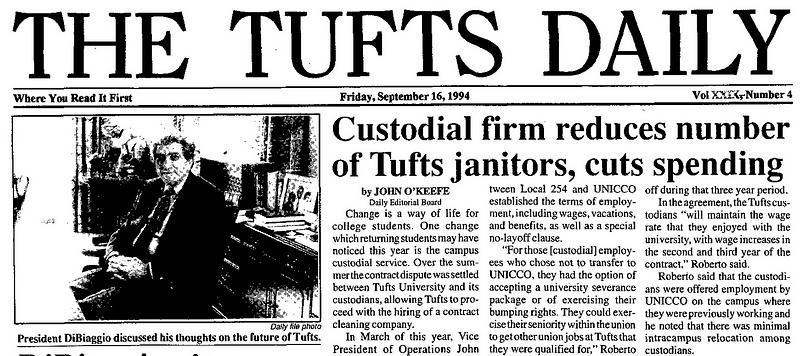
The University Cleaning Company (UNICCO), the company with which Tufts decided to contract, would save the administration $500,000 dollars that year, and any where from one to one-and-a-half million dollars in the coming years, according to a Sept. 16, 1994 Tufts Daily article. Janitors were offered the same salaries and working conditions, but would lose the pension plans and health benefits afforded to only Tufts staff. The janitors’ union, Local 254 of the Service Employees International Union (SEIU), oversaw the new contract negotiations, which went into effect on July 1, 1994.
1997: Layoffs and Outrage
After three years without layoffs, a stipulation of the UNICCO contract led Tufts to terminate its business relationship with the firm. According to a Feb. 4, 1998 story by the Boston Globe, Tufts turned to International Service Systems, Inc. (ISS) to provide contracted custodial services in July 1997. Staff members who were laid off as a result of the shift were offered employment with ISS, but with around a $3.50 reduction in their hourly wage.
The validity of the contract between the janitors’ union, Local 254 of SEIU and ISS was also questioned.A handful of dissident members of the local union, known as the Trabajadores Unidos (or Workers United), claimed that Local 254 collapsed the contract into a so-called “regional master agreement” which combined some 8,000 regional members into a single bargaining unit, according to the Boston Globe article. The union allegedly brought non-Tufts custodians to vote on a contract which impacted Tufts custodians’ pay. The Workers United group claimed that no IDs were checked at the vote to verify if janitors did, in fact, work at Tufts. At the time, the union denied that it had committed any wrongdoing.
According to an Aug. 20, 1997 Boston Globe article, then-Somerville Mayor Michael Capuano wrote to then-Tufts President John DiBiaggio about the impact of that summer's change in contract.
"These people have been treated as little more than an employee number," Capuano wrote in 1997. "They have been part of the Tufts family for years and, as such, deserve more than a choice between a last minute termination or a serious reduction in their lifestyles."
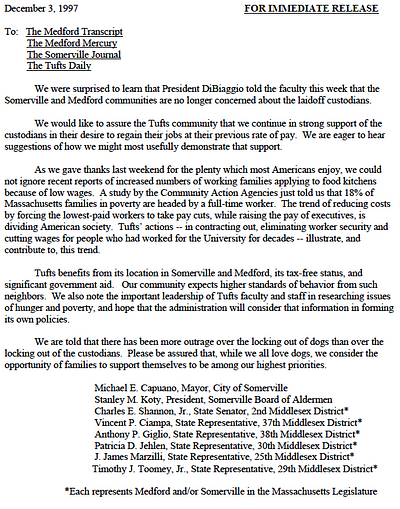 City and State Representatives express their support for laid-off custodians.
City and State Representatives express their support for laid-off custodians.According to a speech delivered by Dr. Gary Goldstein, a professor in the Physics department, at a 1998 Meeting of the Ethical Society of Boston, picket protests were held in front of Ballou Hall each week, and a petition written by Tufts faculty and staff was signed by 150 people and sent to DiBiaggio. Parents and alums wrote letters, and several members of the Somerville Board of Aldermen and the State government called on Tufts to rehire its long term workers, Goldstein said the in the speech.
1998: Janitors Struggle for Food, File Lawsuits

In February 1998, about six months after Tufts switched its contract from UNICCO to ISS, a group of custodians filed three separate lawsuits against the university, against their union and against the subcontractors, according to a Feb. 28, 1998 Boston Globe article.
“[The] lawsuit alleges that the 18,000-member union violated its duty to fairly represent the custodians . . . and that union officials did not attempt to enforce collective-bargaining accords that would have protected their jobs," according to the Globe.
Robert Warren, the janitors' representative in the proceedings of the three lawsuits, also specifically addressed workers' complaints about the university.
"The custodians feel they were not treated with respect after spending most of their adult lives working for Tufts," he said.
At the time, university and union officials declined to comment. The three lawsuits were eventually dropped due to prohibitive legal expenses, according to Goldstein's speech.
According to a March 2, 1998 Boston Globe story, the Center on Hunger, Poverty and Nutrition Policy at Tufts Friedman School of Nutrition Science and Policy launched a food drive to help support 20 struggling janitors who used to work at Tufts.
“These are Tufts families who are going hungry," the Center’s Director, J. Larry Brown, told the Globe. "We, faculty and students, have an obligation to help them."
The central administration, however, refused to promote the campaign through a campus-wide email, citing university policy, according to the March 1998 Globe story.
"There are many worthy humanitarian causes that we could promote," a university spokeswoman said at the time. "But Tufts' policies prohibit the use of its university resources for private causes."
During the 1998 Commencement ceremony, 2000 fliers were distributed and 70 percent of university faculty wore yellow buttons to show support, according to Goldstein's speech.
Later that summer, a survey was distributed to 49 affected janitors by a group called the Faculty/Staff Committee in Support of the Custodians, which included Goldstein, sociology professor Susan Ostrander and history professor Steven Marrone. The survey sought to record information about the lives of former Tufts custodians since the switch to ISS. According to a press release following the collection of the survey's results, over a dozen janitors reported being out of work, and several said they had lost their homes. One janitor was told that area employers were actively discouraged from hiring former Tufts janitors.
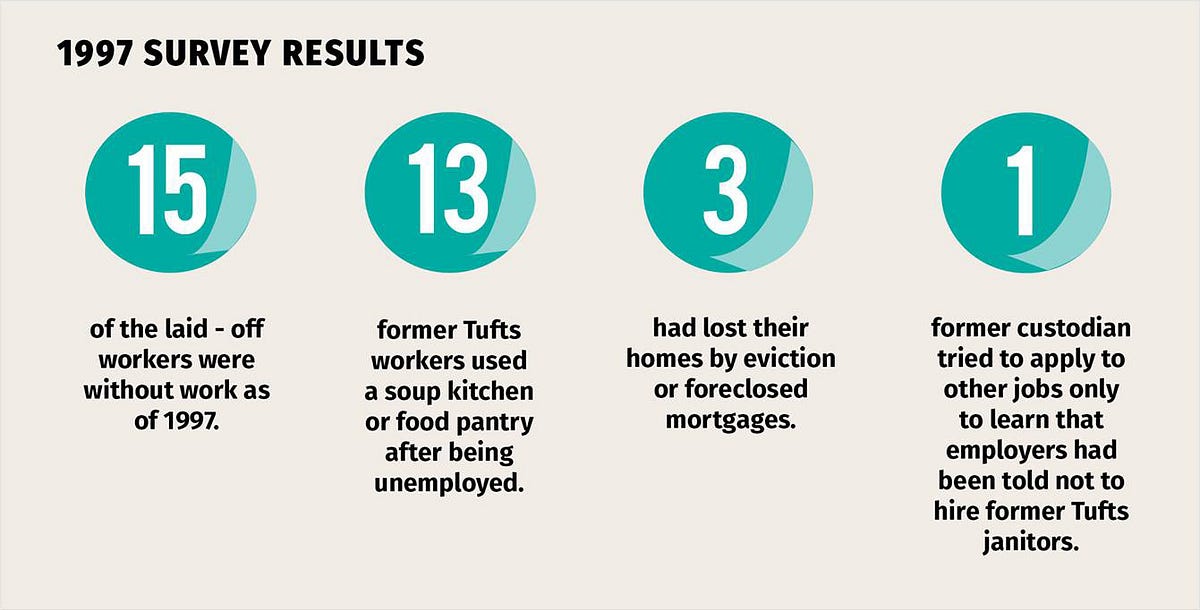 Shirley Wang / The Tufts Daily
Shirley Wang / The Tufts Daily2001: Activists Win
After years of relative quiet, the Student Labor Action Movement (SLAM), a student group organized during the summer of 2001, planned a “learn-in” and several protests, including one at that year’s matriculation ceremony, according to a Sept. 1, 2001 Daily story.
The group’s co-founder, Iris Halpern (LA '02), and a Deputy Trustee of SEIU Local 254, Rocio Saenz, claimed that low wages and a lack of available full-time work were the primary motivations behind their political actions.
As the group's protests intensified, DiBiaggio -- who had retired from his position as university president earlier that year -- said the outsourcing to OneSource (formerly called ISS) saved Tufts nearly $1 million annually, and that increased wages would only burden student tuition fees more, according to a 2001 story in the Daily.
"The only way you will get more money is by increasing the costs for the students," DiBiaggio said.
However, a wage increase, expanded full-time work opportunities and family health insurance were all in fact implemented, according to another 2001 story in the Daily.
These developments led to a protest at Harvard University on March 31, 2002 and a series of strikes and demonstrations across the regiondemanding better job conditions around Sept. 30, 2002.
2004: Positive Negotiations
Tufts’ contract with OneSource was set to expire in June 2004, and according to a Sept. 21, 2003 Daily story, members of SLAM expressed concern about potentially detrimental contract renegotiations. However, after intense negotiations, in the summer of 2004, an amenable agreement was reached, according to a Sept. 22, 2004 Daily article.
"Of course we wanted more, but it’s a negotiation," Union representative Dan Nacolai said. “It’s a good agreement.”
The outcomes of these negotiations included an increase in wages from $11.45 per hour to $13.80 per hour after four years; an increase to three sick days a year in four years' time; superior family and individual health insurance options and an increase in available full-time work.
2008: Gaining Ground
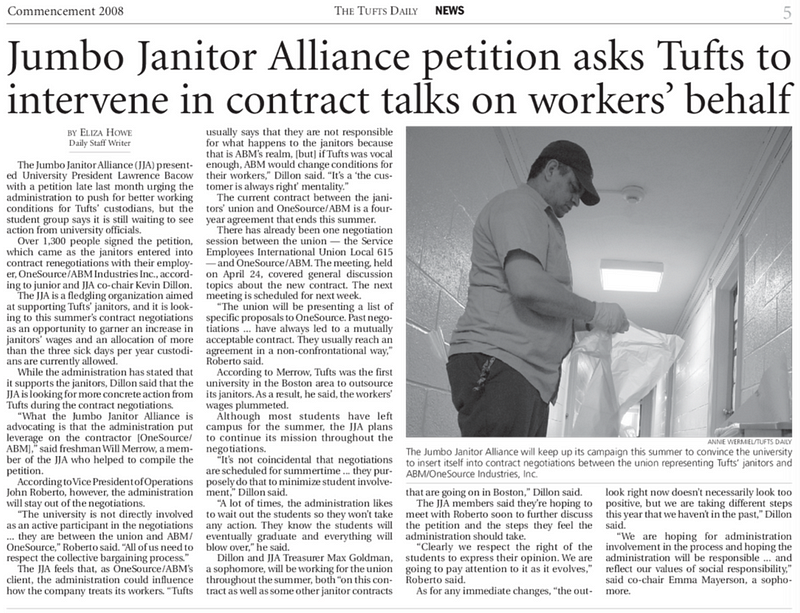
The janitors’ contract with OneSource -- which was acquired by American Building Maintenance (ABM) Industries Inc. in November 2007, according to a Jan. 11, 2008 Daily article -- was once again due for renegotiation. Jumbo Janitor Alliance (JJA), a student group that emerged in 2007, planned to ask for increased wages and more sick days.The union and student activists succeeded in increasing wages and tripling sick days from three to nine, according to an Aug. 28, 2008 article in the Somerville Times.
"[The agreement] includes an 80 cent per hour wage increase each year for the next four years, meaning the janitors will be paid $14.65 an hour in 2009 and $17.05 in 2012," the Somerville Times wrote at the time.
2011: A Formal Grievance
As students returned to campus in September 2011,OneSource/ABM Industries was underbid by UGL UNICCO for Tufts' contract, prompting the university to change its provider, according to a Sept. 20, 2011 Daily article. Activists were concerned that the less expensive contract would mean layoffs for staff, but the university administration denied this possibility.
A month later, on Oct. 23, 2011, union members and students protested 62 vacancies that had yet to be filled by UGL. These vacancies deprived janitors of full-time work opportunities and affected the ability for working janitors to do their jobs, according to a Oct. 24, 2011 Daily story.
“There are a lot of part-time workers and janitors here at Tufts that would love to be full-time and really need the hours in order to get health care and benefits,” Daniel Rosebrock, a junior at the time and JJA member, told the Daily.
In November, SEIU filed a formal grievance against UGL UNICCO, as the vacancy issue had yet to be resolved, a Nov. 2, 2011 Daily story said.
2014: Layoffs Loom
Early in the 2014 fall semester, members of Tufts Labor Coalition (TLC), formerly JJA, reported that they had heard from janitors that a downsizing of the custodial staff was set to take place in the near future. Tufts administrators confirmed these concerns in a Nov. 21 email to the student body, which introduced the restructuring as a means for “improving custodial operations efficiency” and “encouraging ‘green’ behaviors.”
The email explained that DTZ, formerly UGL UNICCO, found Tufts to be inefficiently deploying their janitorial staff. According to an op-ed penned by Patricia Campbell and Vice President of Operations Linda Snyder in April, reorganizing the staff would save the school approximately $900,000 annually.
TLC met with Tufts administrators throughout the fall semester, but escalated their demonstrations over time, including a 33-hour-long occupation of Ballou Hall, according to a Jan. 22 Daily article.
2015: Protests Escalate
The occupation at the end of the fall 2014 semester led to an agreement which prevented any staff cuts until April and included a provision that required Campbell and Snyder to attend a public forum between the community and the administration.
The public forum was attended by Tufts alumni and local politicians, including Somerville Alderman Matthew McLaughlin, who voiced their opposition to the layoffs, according to an April 1 Daily article.
As the semester came to a close, TLC actions included janitorial staff marches on March 10, union rallies in which students and union members were arrested, city resolutions from Medford and Somerville on April 8 and a week-long hunger strike that lasted from May 3 to 9.
Somerville Alderman Mark Niedergang expressed his support for the custodians and student protesters at one of the rallies at the end of last semester.
“When Tufts comes to the City of Somerville for something they need, we will not forget,” he said.
For a comprehensive update on the current state of the janitorial restructuring, please see Part 1 in this series.



